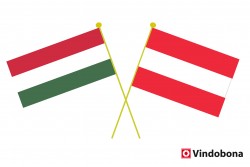 Austria feels that the Hungarian tax is discriminatory and puts Austrian trading companies at a disadvantage. / Picture: © Hungarian and Austrian crossed flags by Vindobona
Austria feels that the Hungarian tax is discriminatory and puts Austrian trading companies at a disadvantage. / Picture: © Hungarian and Austrian crossed flags by Vindobona
Economics Minister Wolfgang Hattmannsdorfer (ÖVP) has sharply called on the EU Commission to take consistent action against the special tax imposed on food chains in Hungary. In two letters to Executive Vice-President Stephane Sejourne and Vice-President Teresa Ribera, the minister demanded swift action against the measures, which he considers discriminatory and undermining the free internal market.
Hattmannsdorfer emphasized that internal market rules must apply to everyone and called for “swift action.” “There must be consistent action against discriminatory measures,” he stated, additionally demanding a swift review of the pending state aid complaint. The minister recently underscored his demand with a warning that the Hungarian special tax jeopardizes the cornerstones of the EU internal market. “If we do not defend its rules, we will lose our credibility, our competitiveness, and ultimately our prosperity,” said Hattmannsdorfer.
Infringement proceedings in the next round
The European Commission has already responded. The infringement proceedings opened in fall 2024 are in the next phase: In June 2025, a reasoned opinion was sent to Hungary. The EU sees a clear violation of the freedom of establishment (Article 49 TFEU), as the applicable maximum tax rates apply to foreign-controlled retail companies, but domestic retailers are spared. Budapest now has two months to respond to the concerns.
If Hungary’s response is insufficient, Austria will push for legal action before the European Court of Justice (ECJ) as the next step. According to Hattmannsdorfer, the unequal treatment leads to a “de facto loss situation for foreign companies,” while Hungarian competitors are spared.
Special tax places massive burden on international chains
Hungary has been levying the special tax on food retailers since 2022. For the largest companies, it amounts to up to 4.5 percent of net sales. International retail chains such as Spar and Hofer are particularly affected, while Hungarian franchise chains and national suppliers are exempt from the regulation or pay only low taxes.
The tax is part of the Orbán government’s strategy to “Hungarianize” the retail sector. The effects are drastic: the Hungarian subsidiary of Spar alone expected the special tax to cost it over 90 million euros in 2024.
Austrian Ministry of Labour and Economy
